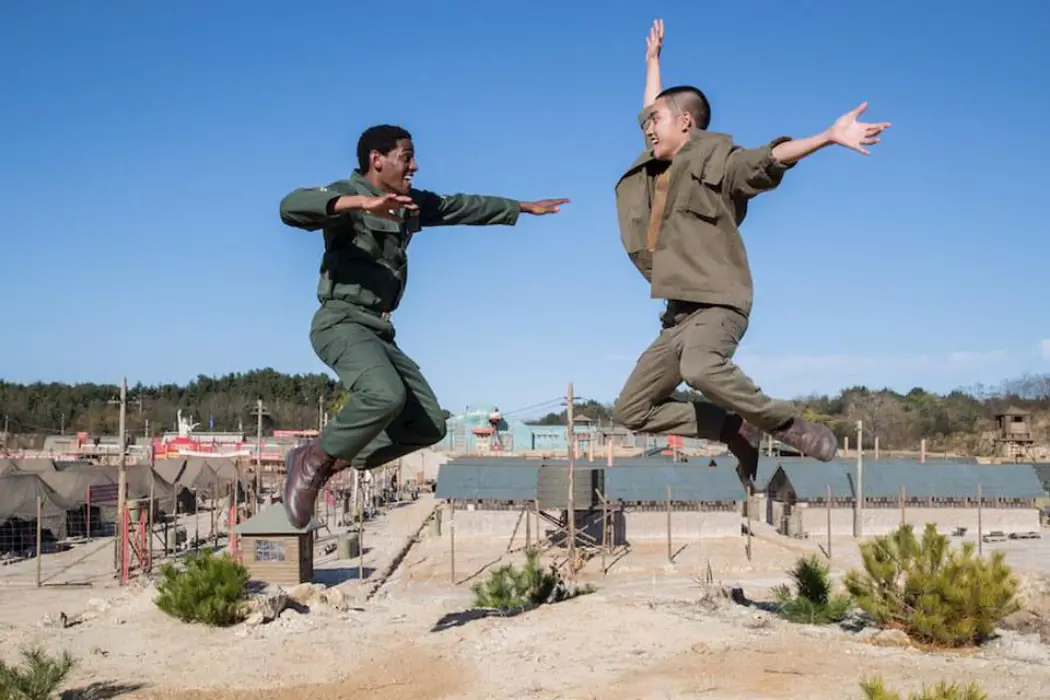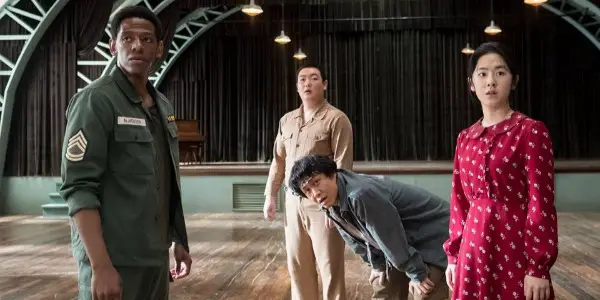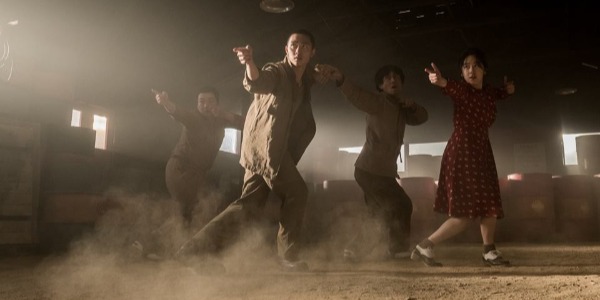SWING KIDS: Tap-Dancing Jazzes Up POW Story

Film critic, Ithaca College graduate, University of St Andrews masters…
Of all the films made about the horrors of war, South Korean tap-dance musical Swing Kids is perhaps the most strange. It’s as if Angelina Jolie’s Unbroken were twisted into a slapstick musical-comedy with intense violence, thick racial slurs and a murderous main character. Hyeong-Cheol Kang’s Swing Kids, which recently screened at the Finger Lakes Environmental Film Festival, boisterously dances the line between knowing genre sandbox and utter tastelessness.
It’s 1951, and the Korean War hammers on, but for the U.S. soldiers stationed at Geoje-do prison camp, it’s a distant rumble of thunder. The truth of Swing Kids is that there was a Geoje-do prison camp, its inmates were treated poorly, and it was fraught with violent conflict between communist and anti-communist POWs. The tap-dancing angle, most likely invented for the story, brings a Dickensian best-of-times worst-of-times feeling. A cheery spoonful of sugar to chase the brutal executions and overwhelming despair.
An Unlikely Setting
Kang, responsible for some of the highest-grossing South Korean films of all time, sometimes gets overpowered by his material. This singing, swinging POW epic is surely the most daring, original vision to come from South Korean cinema in the past several years, but it isn’t without its drawbacks. Intentionally or not, it also updates the obscure Christian Bale starring 1993 Swing Kids, which was set in Nazi Germany among Hitler youth.
Both Swing Kids films make weighty sociopolitical drama butt heads with swing dance, less to prove a point and more to jazz and groove up decidedly un-jazzy, non-groovy narratives. Kang’s film isn’t tasteless, but it sometimes comes close when it forgets about the war and the camp and focuses on the dancing. No matter the tightness of the choreography and the exuberance of that “Sing, Sing, Sing” tap number, you never forget that outside that dance hall, people are suffering. It’s an adaptation of Woo-sung Jang’s stage musical Rho Ki-soo, but the unwieldy mesh of c*cksure dance and the horrors of war probably didn’t gel that well theatrically, either.
This is one of those “assemble a group, win the talent show” movies like Footloose, except most of the dancers are Koreans and Chinese and interned in an American POW camp. Imagine the Bellas of Pitch Perfect but under constant threat of being shot or stabbed to death by prisoners who don’t share their politics.
Kang’s hero, the Kevin Bacon of the Korean War, is Roh Gi-soo, played by K-pop star Kyung-soo Do (known musically as D.O.). He’s a rogue element, a fearless North Korean fanatic unsure of whether to join the group. He’s desperate to learn tap but disgusted at the thought of “Yankee dance.”

The brigadier general in charge (Neal Mcdonough lookalike Ross Kettle) forces former Broadway star Sergeant Jackson (Jared Grimes) to assemble the troupe and have a show ready for Christmas. Jackson is outranked, and he’s the only black soldier in the camp, so he can’t really refuse.
The best he gets are fervent anti-communist Kang Byung-sam (Jeong-se Oh), translator-turned-dancer Yang Pan-rae (Hye-soo Park) and the ailing Xiao Fang (Min-ho Kim), whose heart is too fragile to let him dance for extended periods. The dance sequences are electric and easily the best parts of the film. But there’s something sour in the execution, as Kang’s vision is wildly inconsistent.
Not in the visuals — cinematographer Ji-yong Kim wonderfully elevates the stagey yellows of the dance hall against the hazy cobalt misery of the rest of the camp. Not in the performances, either, as the main cast all-around excellently handles material that asks them to mourn, tap-dance and sometimes do both at the same time: a demanding feat for any actor.
Dance Like Your Life Depends On It
The inconsistency comes with the subject matter and the way Swing Kids forces together harsh realism and exuberant dance. The message of the film is one of multiculturalism and the myth of easy forgiveness. Maybe, Kang argues, we can’t all just get along. Gi-soo learns the Yankee dance and falls in love with it, but it doesn’t exclude him from the racist assaults of American soldiers like Jamie (A.J. Simmons) and his thugs.
One scene finds Gi-soo cornered in a dark tent by Jamie and company. The music is tense, the tent dimly lit and Do’s eyes wide. All signs point to the scene culminating in Gi-soo’s violent beating, or possibly murder.
But the other members of the troupe rush in and face down the American soldiers, and instead of an all-out brawl, the group erupts into a dance-off as though they’re in West Side Story. Everybody dances in Swing Kids, even the violent, racist American soldiers. (Simmons, by the way, handles the dance and the drama just as deftly as Grimes does. The two of them really should be headlining a Broadway musical by now.)

For viewers only concerned with style and Do’s dancing skills, the scene in the tent’s a hoot. But beneath that snazzy veneer is a lie, where actual violence and hard facts are sidestepped to make way for slick choreography.
Swing Kids: Facing Reality
The film does for the Korean War what Life Is Beautiful did for the Holocaust — it injects verve and fun into very grim subject matter. But that film is about hope and the endurance of the human spirit, and it has one essential scene piercing Guido’s antics: that discovery of the smoldering wall of corpses in the fog, challenging Guido to face evil, rotten reality.
Swing Kids couldn’t care less about reality. Even the violence is stylish. The tension between musical and war drama at times overwhelms the picture — but god, even when it’s a failure, Swing Kids is entertaining as hell.
What’s your favorite genre mashup film? Share your thoughts in the comments below!
Swing Kids was released in the United States on December 21, 2018. For all international release dates, see here.
Does content like this matter to you?
Become a Member and support film journalism. Unlock access to all of Film Inquiry`s great articles. Join a community of like-minded readers who are passionate about cinema - get access to our private members Network, give back to independent filmmakers, and more.
Film critic, Ithaca College graduate, University of St Andrews masters student, head of the "Paddington 2" fan club.













